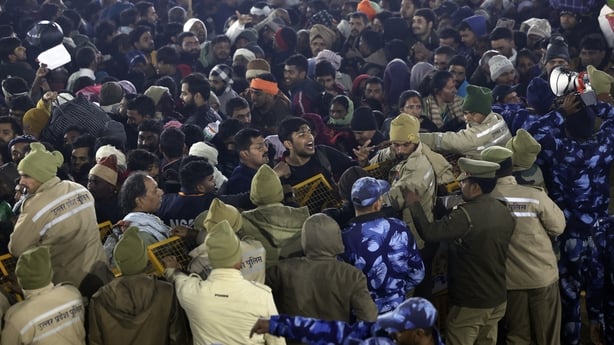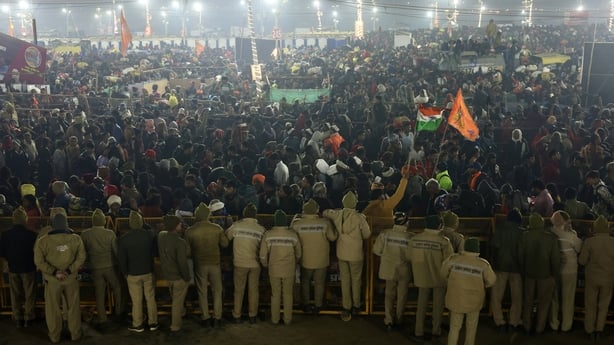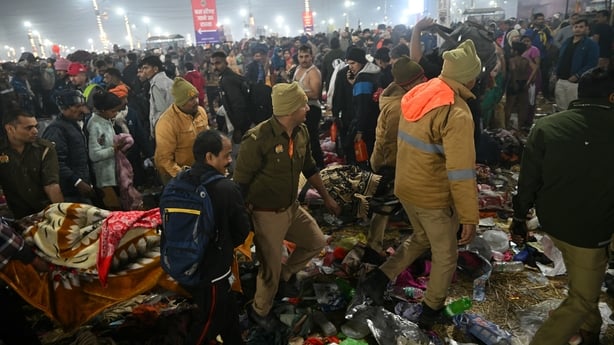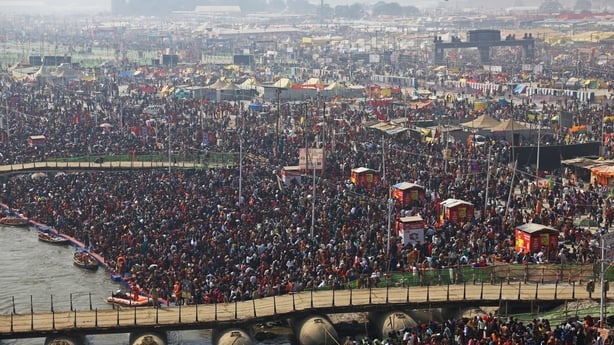Dozens of people were killed in a pre-dawn stampede at the Maha Kumbh Mela in northern India, police sources said, as millions of people gathered to take a dip in sacred river waters on the most auspicious day of a six-week Hindu festival.
State authorities said at least 30 people were killed and 60 were injured in the stampede. Three police sources and a Reuters witness put the toll at nearly 40.
Reuters counted 39 bodies inside the morgue of the local hospital. One of the three police sources and a fourth officer said all 39 were stampede victims. All three police sources said nearly 40 bodies had been brought to the morgue.
We need your consent to load this rte-player contentWe use rte-player to manage extra content that can set cookies on your device and collect data about your activity. Please review their details and accept them to load the content.Manage Preferences
Bodies were still being brought to the Moti Lal Nehru Medical College hospital morgue more than 12 hours after the tragedy at the world's biggest gathering of humanity.
"More bodies are coming in. We have nearly 40 bodies here. We are transferring them out as well and handing over to families one by one," one of the sources said.
Rescue teams carrying victims from the accident site weaved through piles of clothes, shoes and other discarded belongings.
Police were seen carrying stretchers bearing the bodies of victims draped with thick blankets.

A senior police officer told reporters that 90 people were taken to the hospital after the stampede, of whom 30 died and the rest were being treated.
Distraught relatives queued up to identify those killed by the stampede, which occurred when crowds surged towards the confluence of three rivers, where immersion is considered particularly sacred.
Some witnesses spoke of a huge push that caused devotees to fall on each other, while others said closure of routes to the water brought the dense crowd to a standstill and caused people to collapse due to suffocation.
"There was commotion, everybody started pushing, pulling, climbing over one another. My mother collapsed...then my sister-in-law. People ran over them," said one woman as she sat in an ambulance with the bodies of her relatives.
Another woman blamed police for the deaths of four members of her family.
"Police didn't make proper arrangements. They are responsible for this," she cried.
The state government praised the police and said their "swift and effective response ... prevented a potential tragedy".
"The police acted quickly to restore order and ensure the safety of the pilgrims, significantly minimising the situation's impact," it said in the first official statement from authorities about the stampede.

Prime Minister Narendra Modi offered condolences to "devotees who have lost their loved ones", without specifying the number of dead.
The Hindu festival is expected to draw some 400 million people overall, according to officials, compared with the Haj pilgrimage in Saudi Arabia which drew 1.8 million last year.
By yesterday, nearly 200 million people had attended the festival since it started two weeks ago, officials said, adding that more than 57 million people had taken a holy dip today.
Devout Hindus believe taking a dip at the confluence of three sacred rivers - the Ganga, the Yamuna, and the mythical, invisible Saraswati - absolves people of sins and, during the Kumbh, also brings salvation from the cycle of life and death.
Mr Modi was expected to visit the festival next month.
Authorities had expected a record 100 million people to throng the temporary township in Prayagraj today, and had deployed additional security and medical personnel along with AI-software-based technology to manage the crowd.
A Rapid Action Force (RAF) - a special police unit called in during crisis - was deployed to bring the situation under control after the stampede and the 'holy dips' were also closely regulated, with devotees going first and ascetics beginning their processions only after devotee numbers reduced.

Television visuals showed scores of ascetics, smeared in holy ash or wearing saffron, moving towards the confluence as security personnel and dense crowds of devotees looked on and helicopters showered petals from above.
Social media posts spoke of heavy traffic congestion on roads leading into Prayagraj as authorities tried to manage the crowd, leaving several people stranded.
"I planned this trip for over a year, but I've been stuck in traffic for 19 hours," American travel blogger Drew Binsky said on Instagram, where he has more than 1.2 million followers.
Opposition parties blamed the stampede on what they called the government's "mismanagement" and "VIP culture".

"VIP culture should be curbed and the government should make better arrangements to meet the needs of common devotees," Rahul Gandhi, leader of main opposition Congress party, said on X, referring to politicians and celebrities being treated differently.
A similar stampede on the most auspicious day of the festival when it was last held in 2013 had killed at least 36 pilgrims.

